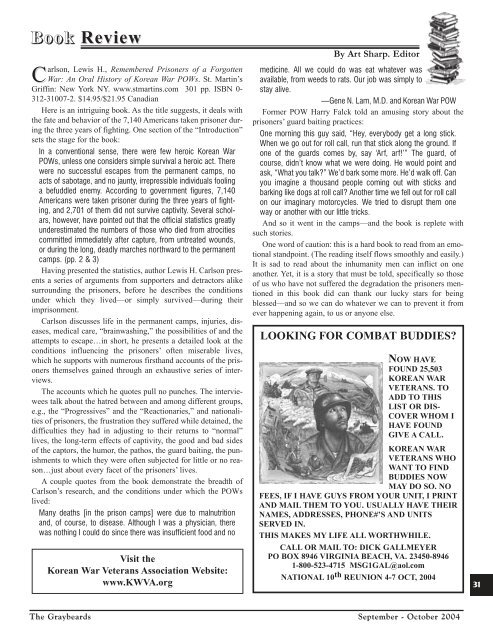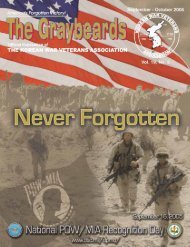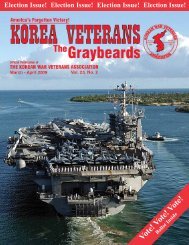Sep/Oct 2004 Graybeards - KWVA - Korean War Veterans Association
Sep/Oct 2004 Graybeards - KWVA - Korean War Veterans Association
Sep/Oct 2004 Graybeards - KWVA - Korean War Veterans Association
Create successful ePaper yourself
Turn your PDF publications into a flip-book with our unique Google optimized e-Paper software.
Book Review<br />
Carlson, Lewis H., Remembered Prisoners of a Forgotten<br />
<strong>War</strong>: An Oral History of <strong>Korean</strong> <strong>War</strong> POWs. St. Martin’s<br />
Griffin: New York NY. www.stmartins.com 301 pp. ISBN 0-<br />
312-31007-2. $14.95/$21.95 Canadian<br />
Here is an intriguing book. As the title suggests, it deals with<br />
the fate and behavior of the 7,140 Americans taken prisoner during<br />
the three years of fighting. One section of the “Introduction”<br />
sets the stage for the book:<br />
In a conventional sense, there were few heroic <strong>Korean</strong> <strong>War</strong><br />
POWs, unless one considers simple survival a heroic act. There<br />
were no successful escapes from the permanent camps, no<br />
acts of sabotage, and no jaunty, irrepressible individuals fooling<br />
a befuddled enemy. According to government figures, 7,140<br />
Americans were taken prisoner during the three years of fighting,<br />
and 2,701 of them did not survive captivity. Several scholars,<br />
however, have pointed out that the official statistics greatly<br />
underestimated the numbers of those who died from atrocities<br />
committed immediately after capture, from untreated wounds,<br />
or during the long, deadly marches northward to the permanent<br />
camps. (pp. 2 & 3)<br />
Having presented the statistics, author Lewis H. Carlson presents<br />
a series of arguments from supporters and detractors alike<br />
surrounding the prisoners, before he describes the conditions<br />
under which they lived—or simply survived—during their<br />
imprisonment.<br />
Carlson discusses life in the permanent camps, injuries, diseases,<br />
medical care, “brainwashing,” the possibilities of and the<br />
attempts to escape…in short, he presents a detailed look at the<br />
conditions influencing the prisoners’ often miserable lives,<br />
which he supports with numerous firsthand accounts of the prisoners<br />
themselves gained through an exhaustive series of interviews.<br />
The accounts which he quotes pull no punches. The interviewees<br />
talk about the hatred between and among different groups,<br />
e.g., the “Progressives” and the “Reactionaries,” and nationalities<br />
of prisoners, the frustration they suffered while detained, the<br />
difficulties they had in adjusting to their returns to “normal”<br />
lives, the long-term effects of captivity, the good and bad sides<br />
of the captors, the humor, the pathos, the guard baiting, the punishments<br />
to which they were often subjected for little or no reason…just<br />
about every facet of the prisoners’ lives.<br />
A couple quotes from the book demonstrate the breadth of<br />
Carlson’s research, and the conditions under which the POWs<br />
lived:<br />
Many deaths [in the prison camps] were due to malnutrition<br />
and, of course, to disease. Although I was a physician, there<br />
was nothing I could do since there was insufficient food and no<br />
Visit the<br />
<strong>Korean</strong> <strong>War</strong> <strong>Veterans</strong> <strong>Association</strong> Website:<br />
www.<strong>KWVA</strong>.org<br />
By Art Sharp. Editor<br />
medicine. All we could do was eat whatever was<br />
available, from weeds to rats. Our job was simply to<br />
stay alive.<br />
—Gene N. Lam, M.D. and <strong>Korean</strong> <strong>War</strong> POW<br />
Former POW Harry Falck told an amusing story about the<br />
prisoners’ guard baiting practices:<br />
One morning this guy said, “Hey, everybody get a long stick.<br />
When we go out for roll call, run that stick along the ground. If<br />
one of the guards comes by, say ‘Arf, arf!’” The guard, of<br />
course, didn’t know what we were doing. He would point and<br />
ask, “What you talk?” We’d bark some more. He’d walk off. Can<br />
you imagine a thousand people coming out with sticks and<br />
barking like dogs at roll call? Another time we fell out for roll call<br />
on our imaginary motorcycles. We tried to disrupt them one<br />
way or another with our little tricks.<br />
And so it went in the camps—and the book is replete with<br />
such stories.<br />
One word of caution: this is a hard book to read from an emotional<br />
standpoint. (The reading itself flows smoothly and easily.)<br />
It is sad to read about the inhumanity men can inflict on one<br />
another. Yet, it is a story that must be told, specifically so those<br />
of us who have not suffered the degradation the prisoners mentioned<br />
in this book did can thank our lucky stars for being<br />
blessed—and so we can do whatever we can to prevent it from<br />
ever happening again, to us or anyone else.<br />
LOOKING FOR COMBAT BUDDIES?<br />
NOW HAVE<br />
FOUND 25,503<br />
KOREAN WAR<br />
VETERANS. TO<br />
ADD TO THIS<br />
LIST OR DIS-<br />
COVER WHOM I<br />
HAVE FOUND<br />
GIVE A CALL.<br />
KOREAN WAR<br />
VETERANS WHO<br />
WANT TO FIND<br />
BUDDIES NOW<br />
MAY DO SO. NO<br />
FEES, IF I HAVE GUYS FROM YOUR UNIT, I PRINT<br />
AND MAIL THEM TO YOU. USUALLY HAVE THEIR<br />
NAMES, ADDRESSES, PHONE#’S AND UNITS<br />
SERVED IN.<br />
THIS MAKES MY LIFE ALL WORTHWHILE.<br />
CALL OR MAIL TO: DICK GALLMEYER<br />
PO BOX 8946 VIRGINIA BEACH, VA. 23450-8946<br />
1-800-523-4715 MSG1GAL@aol.com<br />
NATIONAL 10 th REUNION 4-7 OCT, <strong>2004</strong><br />
31<br />
The <strong>Graybeards</strong> <strong>Sep</strong>tember - <strong>Oct</strong>ober <strong>2004</strong>

















